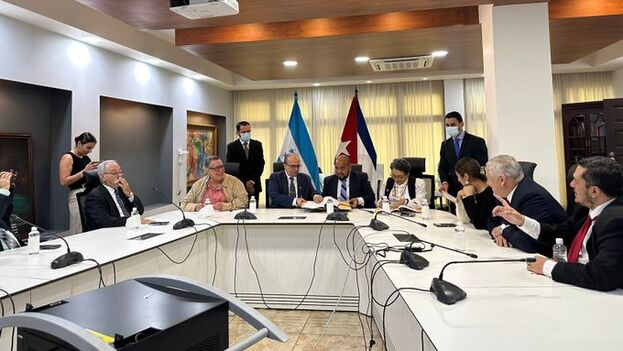
![]() 14ymedio, Olea Gallardo, Havana, 2 January 2023 — Honduras will receive 10 Cuban “high-level education professionals” to help develop a new academic curriculum design that “will completely change the educational model.” This was reported by the Government of Tegucigalpa after the signing of an agreement between the two countries, last Tuesday.
14ymedio, Olea Gallardo, Havana, 2 January 2023 — Honduras will receive 10 Cuban “high-level education professionals” to help develop a new academic curriculum design that “will completely change the educational model.” This was reported by the Government of Tegucigalpa after the signing of an agreement between the two countries, last Tuesday.
The agreement will last for three years and aims to “contribute to the design and implementation of the process to transform education from the perspective of curriculum, beginning with the establishment of cooperative relations between the two countries.”
The Secretariat of Strategic Planning of Honduras, together with the Secretariats of Education and Cultures, signed the agreement with the Ministry of Education of Cuba, announced through a promotional video published on social networks: “Our educational system will be universal, inclusive, participatory, secular and scientific. Just as it should be and not like the one that is being applied.”
In the photos, a good-looking young white woman details in just under two minutes, smiling and with exaggerated gestures, the importance of the agreement. “The system prioritizes four aspects of teaching: literacy, universal access to education, the importance of teachers and education focused on social change,” she explains, referring to education in Cuba.
Honduras, she continues, “will take as an example this system, which is one of the best in the world, and will make the exclusive system inclusive, and we will begin to raise the cultural level of the population by deepening values such as solidarity and cooperation, taking as a starting point the thought of General Francisco Morazán [founding father of Honduras, nicknamed “the Simón Bolívar of of Central America”], and thus we will eliminate social discrimination through education, and we will be equal.”
The speaker emphasizes that “the Cuban school system transmits its knowledge and achievements to 43 countries, and Honduras will now be one of them.” Although the Ministry of Education of Cuba does not currently have updated figures on its international missions, in 2013 it did make public that those countries had a total of 2,326 teachers, then the highest figure recorded, and they intended to increase it in the following years.
At that time, the largest group (423) was in Venezuela, the country with the highest presence of Cuban educators, followed by Equatorial Guinea, with 221, and Angola, with 219. By 2015, Angola had 1,400 teachers.
South Africa and El Salvador are other nations with which the Island has signed educational agreements. The export of professionals — mainly doctors but also teachers, engineers, sailors, architects and even artists — is the main source of funding for the regime, and is considered by several international organizations, such as Human Rights Watch and Prisoners Defenders, as forced labor.
In Honduras, another educational agreement with Cuba is in force, which advises on the Honduran national literacy program with the system called Yo Sí Puedo [Yes I Can], exported to countries such as Mexico.
That agreement was not without controversy, and, in the face of complaints from national teachers, the Honduran Deputy Minister of Education, Edwin Hernández, had to clarify that Cuban teachers would not teach and that “they would only be a support.”
“What we will have is advice; that is, Cuban teachers of high technical level are going to advise us on establishing the program in the country; those who are going to teach literacy are Honduran teachers,” he said last August, while clarifying that his department had not yet “generated expenses for the consultancies.”
“The investment in the Cuban assistance, in relation to the results that this is going to bring, will be minimal,” said the official.
Both countries signed a “memo of understanding” last July, through the Ministry of Foreign Affairs of Honduras and the Ministry of Foreign Trade and Strategic Investment of Cuba. Although the details have not yet come to light, the Honduran Foreign Secretary, Eduardo Enrique Reina, declared: “With this memorandum, we open up the possibility of moving through new paths of collaboration in science and technology, literacy programs and the exchange of scholarships, among other things.”
Tegucigalpa approached Havana again after the electoral victory of Xiomara Castro, former first lady and wife of former Honduran president Manuel Zelaya, deposed on June 28, 2009 when he promoted constitutional reforms that the law prevented him from doing.
Before her election as the first female head of state, the media and the opposition had warned that Castro’s program followed a chavista* plan of “national rebuilding,” something that, in the light of the newly signed agreement, seems to be true.
*Translator’s note: Chavista — i.e. after former Venezuelan president Hugo Chavez
Translated by Regina Anavy
____________
COLLABORATE WITH OUR WORK: The 14ymedio team is committed to practicing serious journalism that reflects Cuba’s reality in all its depth. Thank you for joining us on this long journey. We invite you to continue supporting us by becoming a member of 14ymedio now. Together we can continue transforming journalism in Cuba.
